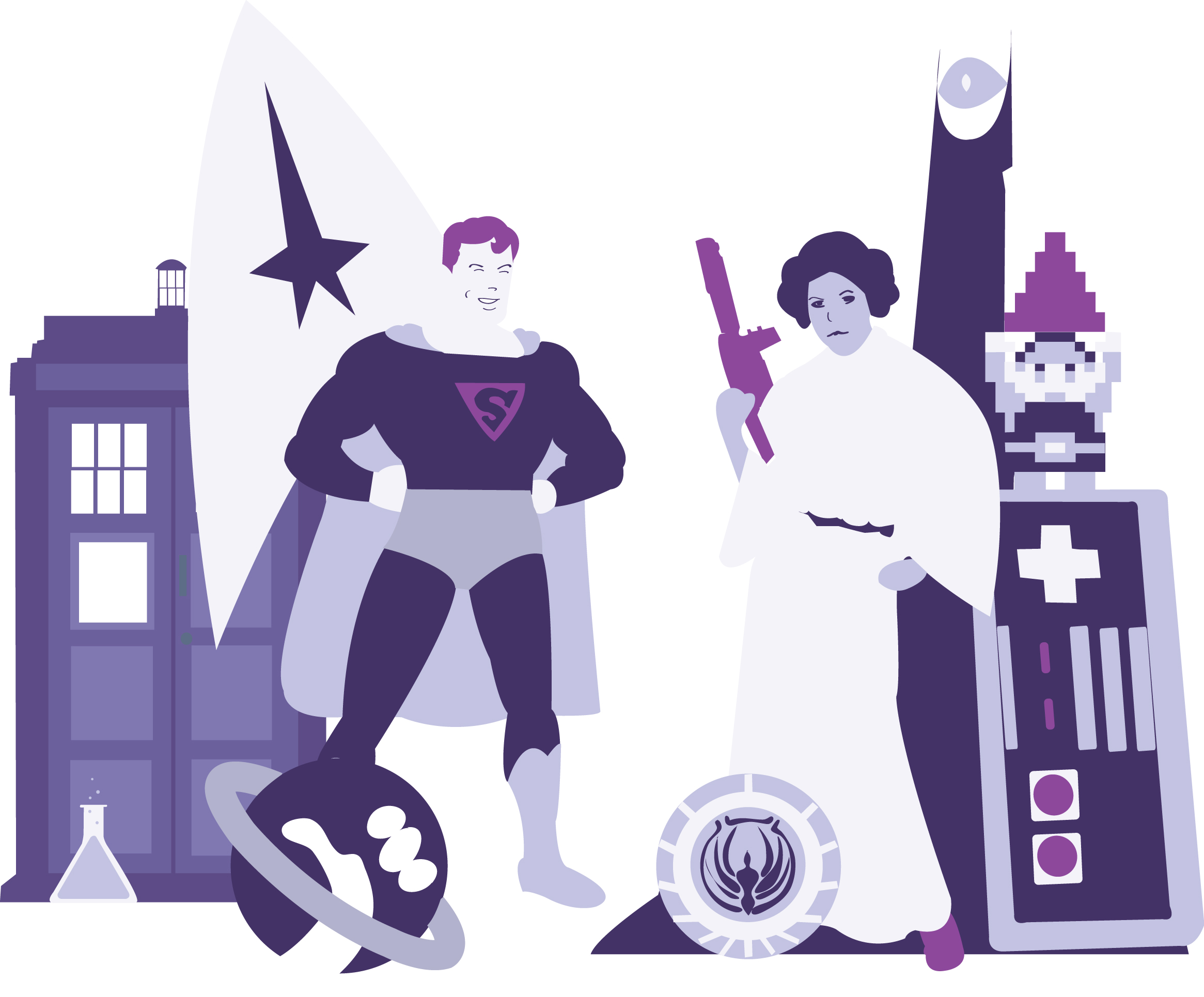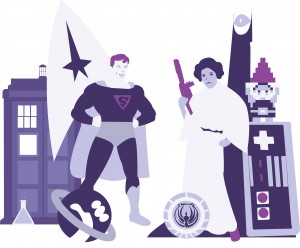Revenge of the nerds: the rise and prominence of ‘nerd’ culture


Nerds around the world, rejoice!
The beloved culture of comic books, sci-fi, video games, science, technology and other activities deemed nerdy or geeky is in the mainstream and seems to be here to stay.
In the past, parts of the culture have risen in popularity, however it has never been as widely accepted and appreciated as in this generation.
Charlotte Armstrong of Nerd Nite KW explained that a nerd is “just someone who is really passionate about something. It can be anything; you can be a history nerd, video game nerd — everything.”
“I don’t think its something you should be ashamed of,” added video game fan and fourth year Laurier student Luke Schultz.
To many people, nerd culture is a brand new experience for them. To the lifelong fans however, it is just a part of their every day life.
“As a young child I never really thought of it as different or sci-fi. I never thought of them as a genre, they were just what I did,” said Renee Ward, a professor at Wilfrid Laurier University. The Laurier English professor grew up immersed in science fiction, watching Dr. Who, Star Wars, the original Star Trek and Battlestar Galactica. To her, it was not “nerd culture,” it was just something that she enjoyed.
Similarly to Ward, Schultz has been absorbed by nerd culture his whole life.
“I started actually playing games in early grade school, and once I got my first MMO [massively multiplayer online] game, that was the big push. Paying $15 a month to play a video game is a certain degree of dedication,” he continued.
More recently, being a nerd or a geek has become much more socially acceptable in mainstream culture; something that was once an ignored or ridiculed counterculture, has risen up and become its own increasingly admired community.
“For me, it’s always been relevant. It was weird to me that other people were sharing the same interests as me — I thought it was just a coincidence. But I am learning that it’s become more popular in general, and I think part of it is that its almost become cool to be geeky,” explained Paolo Ferrari, the former president of Laurier’s Comic Book Association.
Becoming mainstream
What was once ostracized has become exceedingly mainstream and widely accepted in pop culture today. Superhero films, zombie culture, comic books, video games, sci-fi literature and television shows are now highly anticipated and beloved by many.
“It’s kind of developing into something that is more socially acceptable. To talk to your friends about Game of Thrones, that might not have been common ten years ago. It’s cool that it’s gained so much attention,” explained Schultz.
The growing acceptance of the culture has given more recognition to lifelong fans, and has ushered in a whole new generation of nerd culture admirers.
“I think it speaks a lot to the idea of dystopias or utopias. The sense that something is lacking in our own culture or world, so we seek for it elsewhere. It’s a type of escapism. We’re dissatisfied,” explained Ward.
Escaping to the fantasy worlds of nerd culture brings solace to fans young and old, newfound and lifelong. Getting lost in the pages of a comic book, a documentary or a video game is now not only acceptable but also widely appealing. Many factors have contributed to the rising appreciation for this former counterculture, but two key causes are the continuous revitalizations of franchises and advances in technology.
Revitalizing the classics
Over the past generation, reboots of Star Trek, Superman, Star Wars, Battlestar Galactica, Batman, and countless adaptations of comic books and sci-fi novels have brought in new admirers while at the same time trying to appeal to the original fandom.
However, the original fans are not always easy to please when it comes to reboots of their favourite franchises.
“Some people get really offended because they’re so completely married to the original, and I certainly have those feelings about, say, the Star Wars films,” Ward stated. “We cling to these things because of their nostalgic value, they are a part of our past and a part of our childhood. Something that we loved so dearly we don’t envision them in any other way.”
Like many fans, Ferrari agrees that original fans could suffer because of the surge in the popularity of nerd culture.
“Unfortunately I do feel as though there will be a saturation that happens, and the quality of the things that are being produced will go down. I think as they start to cater towards general audiences, the parts that the original fans really liked will start to be ignored to try to accommodate those tastes,” he explained.
Despite some fears and hesitations from lifelong fans, they cannot deny that there are many positives to reboots as well.
“In no way can you argue that these new franchises coming out are going to be as great as the originals, but you’re not going to reboot a series to remake it 100 per cent,” said Schultz. “I think its great that they’re rebooting these franchises because it allows people who didn’t get into them when they were younger or didn’t have them around, now they have the opportunity to do that again.”
The culture they love so deeply is finally getting the attention and acceptance it deserves because of these revitalizations. They have encouraged new supporters to look back to the original work and become immersed in them as the lifelong fans have done before them.
Technological advances
Progress in technology has a direct correlation with the popularity of nerd culture. Technology not only makes it easier to learn more and connect with people with shared interests, but it directly links us to the culture as things we read and watch become more realistic.
“Our world is progressing so quickly. The boundaries between man and machine are so crucial to our own culture because we’re ‘plugged in’ in so many ways, and I think a lot of the importance or the attraction to these narratives is our way of coping or exploring what these leaps and bounds in technology may mean, as well as our fears,” said Ward.
Those who immerse themselves in the culture tend to be intensely curious, according to Armstrong. Consequently, technology is increasingly important as they utilize it to gain information.
“We can access way more information than we could before. Those of us with a curious nature, we can just access all this information at our fingertips, and it makes us want more. It’s almost addictive,” she emphasized.
“Because we’re so connected its easy to find things on the Internet, and to talk to people on message boards who also enjoy the shows or the games. These different aspects of nerd culture that they might not be able to get in their everyday lives, so I think it’s pretty great that we have this technology where it’s so easy to communicate with people,” Schultz added.
Communicating through online mediums provides fans of nerd culture with a sense of community, which were essential in a time before the culture became mainstream.
A sense of community
“As a kid who necessarily didn’t fit in all the time, to me these environments were crucial growing up. It gave you a place where we all wished to feel that we belong and have community in the sense of shared interest,” said Ward.
Before this generation’s common involvement in nerd culture, those who were a part of it had few people to talk about their interests with. Online communities and comic conventions provided them with the sense of belonging they desired, and allowed them to interact with other fans.
“It’s no longer just about the artifacts themselves, it’s about the commodity culture that goes with it. The fact that you can go out and buy a costume and dress up as your favourite Star Trek character, it’s kind of a participatory culture,” she continued.
As the culture grows, so do the communities surrounding it. Nerds and geeks can discuss their interests with just about anyone. Comic conventions are constantly growing in attendance. Sci-fi and superhero movies break records at the box office. Society has realized that it is cool to be a nerd.
“It’s really nice to find other people who are really passionate about the same things you are, and you can learn so much off of each other. It feels good to find people who accept that kind of behaviour.
It’s definitely gotten a lot easier to talk to people about stuff like that, so its nice that we have these opportunities now,” said Schultz.
However, despite the widespread acceptance of the culture, barriers between society and nerd culture still exist.
Breaking the stigmas
“People of certain generations still use the word nerd as a derogatory term, but I’m like ‘oh, that’s awesome, I’m glad I’m a nerd,’” emphasized Armstrong.
“I don’t like feeding the idea that we’re socially awkward, because we’re not, we’re just particular about what we want to do. I think that comparison of The Big Bang Theory is really frustrating,” she continued.
Nerd culture still carries stigmas and negative undertones in society, and nerds and geeks alike agree that they need to be put in the past.
“The whole idea of being a gamer still has that negative connotation, normally people think if a guy is a gamer he lives in his mom’s basement and is non stop everyday. I’d like to see us move past that,” said Schultz.
Most people can say they have gone to see and enjoyed watching a superhero movie, read a sci-fi novel, been interested in science and technology, and been truly passionate about something. And take it from the nerds themselves; if you are passionate about something, you are a nerd.


